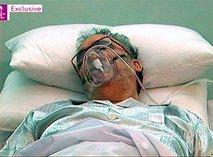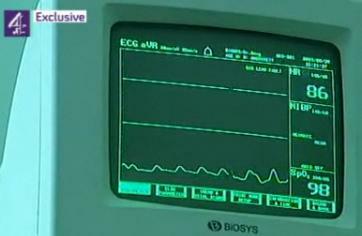Lockerbie Bomber Megrahi Hospitalized for Prostate Cancer
Is Abdelbaset Ali Mohmed al-Megrahi, the convicted and now released Lockerbie bomber, really on the brink of dying of prostate cancer? Official letters about his release from prison in Scotland omit his medical records. These records remain sealed.
According to a Libyan official Mr Megrahi, age 57, “is a dying man.” Libyan Secretary of State for Foreign Affairs, Mohammed Sialam, told reporters that al-Megrahi is in worsening condition and is not expected to survive much longer.
 At home in Tripoli, over the weekend he was rushed to hospital. A British TV team was invited in to film him in his private room. Fluorescent light turns greenish on TV and he looks quite ill. Channel 4 (UK)’s Jonathan Miller says “It looked to me as though Abdel Basset al-Megrahi wasn’t long for this world.” But a vital signs monitor, which looks only half half hooked-up, shows his heart rate within normal range.
At home in Tripoli, over the weekend he was rushed to hospital. A British TV team was invited in to film him in his private room. Fluorescent light turns greenish on TV and he looks quite ill. Channel 4 (UK)’s Jonathan Miller says “It looked to me as though Abdel Basset al-Megrahi wasn’t long for this world.” But a vital signs monitor, which looks only half half hooked-up, shows his heart rate within normal range.
Mr. Miller says he has been stalking Mr. Megrahi for about a month. This weekend, after waiting about outside the house for a scheduled interview, he saw a troop of police arrive. A private care drove away at speed with Megrahi hunched over in the passenger seat. Later that day the TV team received a phone call inviting them to the hospital room. They found Megrahi propped up in bed. No hospital gown — he’s wearing what look like silk pajamas. In the video, taken in what Miller says was a “darkened room,” he looks ashen beneath an oxygen mask. Miller said he was “gasping and rasping.” At the head of the bed on the right an IV pole is hung with a bag of clear fluid.
Everyone agrees Megrahi has prostate cancer. Whether he has received any effective treatment at all is unknown. Even advanced metastatic prostate cancer may respond to several successive levels of androgen blockade therapy and also to chemotherapy. The British and US public do not know whether this man has received such treatment.
UK reporters point out that the doctor who stated that Megrahi had only about 3 months to live — testimony which aided Megrabi’s release — is not a prostate cancer specialist. This doctor s described by UK sources as a general practitioner. According to the Scottish Sunday Herald, the man who decided to accept the GP’s word, Scottish Prison Service’s director of health and care, Andrew Fraser, is “an expert in public health and drug addiction, not cancer.”
Some aspects of this situation don’t appear to fit with emergency care of an advanced or a dying cancer patient. First off, friends and family of don’t normally call in a bus load of police instead of an ambulance.
Reports say that last Wednesday al-Megrahi’s father told the London-based Asharq Al-Awssat newspaper that his son was not dying. “It is not that serious as some news media have been portraying,” Ali al-Megrahi told the newspaper. “I see he is improving day by day, and he is better than the day he returned.”
This might be sheer denial or an effort to keep up hopes. In any case, emergencies can arise out of the blue for a man fighting advanced prostate cancer. Perhaps Mr. Megrahi was exhausted by the thousands of visitors he received at his home after his return from prison in Scotland. Or maybe he had a panic attack when the TV channel sought to question him at home. Or in view of his lengthy air travel from the UK, perhaps he suffered a thrombosis — a condition cancer patients are quite liable to develop — or even a pulmonary embolism.
On the other hand, if Mr. Magrahi is close to dying from metastatic cancer, and over the weekend his condition rapidly worsened, why would he have agreed to an interview? And it seems almost an outrage for the TV team to try to question him on his deathbed when told no questions would be allowed. Why did the relatives, backed up with all those police, let the cameras in?
So the question arises, was this hospitalization staged to show the world, through TV, what may or may not be true — that he is dying? From the video one can see that he has tape on his right hand. This is probably strapping down a heparin lock attached to a tube to the IV bag, which may be delivering hydration or (possibly) painkillers. A nurse hovers by the bedside. No doctors in evidence. TV is on. And what about that monitor? It was beeping, Miller says. What does it say?
 A nurse I consulted says: “it looks like the heart rate is 86 beats per minute and the pulse oxygen is 98% which looks real good but the leads must not be hooked up right.” She adds: “The heart rate could come from the pulse oximeter but the straight lines show that there is no electrical activity being monitored.”
A nurse I consulted says: “it looks like the heart rate is 86 beats per minute and the pulse oxygen is 98% which looks real good but the leads must not be hooked up right.” She adds: “The heart rate could come from the pulse oximeter but the straight lines show that there is no electrical activity being monitored.”
The patient has a pulse oximeter clipped to a finger of his left hand. Using the oxygen mask, he is within normal range (from 95 to 100 percent).
Mr. Miller winds up his account in his blog:
A hospital orderly in blue approached. ‘Excuse me, please,’ He opened the door and walked in with a trayful of couscous, tomato salad and plump Libyan olives.
I wondered if Mr al-Megrahi might have worked up a bit of an appetite.

Comments are closed.